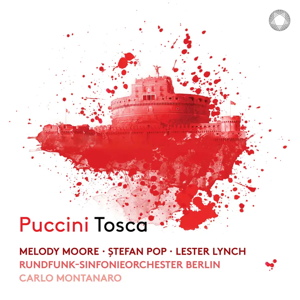
Giacomo Puccini (1858-1924)
Tosca (1900)
Floria Tosca: Melody Moore (soprano)
Mario Cavaradossi: Ștefan Pop (tenor)
Scarpia: Lester Lynch (baritone)
Kinderchor der Deutschen Oper Berlin, Rundfunkchor Berlin
Rundfunk-Sinfonieorchester Berlin/Carlo Montanaro
rec. 2022, Haus der Rundfunks, Berlin, Germany
Synopsis in English and German included
Pentatone PTC5187055 SACD [2 discs: 110]
Tosca is one of the most popular operas in the repertoire. Yet there have been remarkably few totally successful recordings over the years, possibly because the mono De Sabata, recorded way back in 1953, is widely considered one of the greatest opera recordings ever made; in fact number one in Ralph Moore’s list of untouchables. The stereo age brought us a couple more, like Karajan’s first with Leontyne Price and Davis’s with Caballé, but the list is quite small, and these too are quite old. A new modern studio recording is certainly timely.
So, let’s start with the positives. I was listening to the stereo layer, which I tried both through speakers and headphones and the sound really is superb, warm and well balanced, though I did wonder whether the off-stage chorus in ACT II were a little too much in the foreground. I suppose it might be dramatically apt to have the on-stage soloists struggling to be heard, but in that case, I would have thought a sound effect of Scarpia impatiently closing the window were necessary. As it is, the chorus just stops abruptly in mid-phrase for no apparent reason. The Berlin Rundfunk Sinfonieorchester may not be as famous an ensemble as those in Milan and Vienna, but they acquit themselves very well.
Unfortunately, conductor Carlo Montanarlo is rather too literal and prosaic. He rarely lets the music flower and flourish, and his conducting comes across as rigid and perfunctory, moving the music along too fast, almost as if apologising for its eroticism. Great Puccini conductors, like De Sabata and Karajan, understand the importance of rubato, but there is no sweeping lyricism in sections like the orchestral accompaniment to Tosca’s exit in Act I or her entrance in Act III. He is also unable to sufficiently rack up the tension in the second act, or in the lead-up to the shooting in Act III. His conducting is altogether too polite and lacking in passion.
Tosca is sung by the American soprano, Melody Moore, who has already recorded the roles of Butterfly, Giorgetta in Il Tabarro and Minnie in La Fanciulla del West. She has also recorded a recital disc, which is a tribute to another erstwhile famous Tosca, Renata Tebaldi. She has a voice of the right size and weight for the role, though it loses colour a little at the very top. Like so many modern-day singers, she is somewhat sparing in her use of chest voice. There is no exciting plunge into chest when she sings the line Io quella lama gli piantai nel cor. And her whispered È morto! Or gli perdono! Is completely ineffective. Vissi d’arte is rather lovely, possibly because Monatanarlo finally relaxes a bit and allows the music to breathe. I found her a plausible Tosca with a beautiful voice, but a little anonymous. At no point does she begin to challenge the likes of Callas, Price, Tebaldi or Caballé.
The tenor, Stefan Pop, has a pleasant, but essentially lyric voice and I see that, according to his Wikipedia entry, he is more known for the bel canto repertoire. He acquits himself quite well in Recondita armonia and the Act I love duet, but is stretched by Vittoria! Vittoria in Act II. He also sings a sweet-toned O dolci mani but E lucevan le stelle suffers from a surfeit of sobbing and consequent vibrato, possibly to make up for the lack of passion coming from the pit.
But the noose around this Tosca’s neck is the baritone, Lester Lynch as Scarpia. He has an unpleasant, wobbly, woofy baritone that leaks air at every emission. It’s possible, I suppose, that he cuts an imposing figure on stage, but that doesn’t come across on disc and he is a serious blot on the performance, his vocal inadequacies not allowing him to create a real character. Memories of Gobbi and Taddei are not expunged.
Nor, I’m afraid, are memories of Callas, Tebaldi, Price and Caballé or Di Stefano, Carreras, Corelli et al. I suppose that I might have enjoyed this performance of the opera if I’d come across it at a provincial opera house somewhere, but, in all but matters of sound, this set doesn’t begin to compare to those classic recordings of the past that I mentioned above.
Incidentally, most CD issues of the opera have Act I on the first disc and Acts II and III on the second, but Pentatone inexplicably split Act II over the two dsics, the break coming just after Tosca has blurted out the location of Angelotti. Why? This makes no sense at all.
In conclusion, with a different baritone and a more sympathetic conductor, the soprano and tenor might have put in a much more creditable performance. As it is one can rest assured that the De Sabata recording with the exceptional team of Callas, Di Stefano and Gobbi remains “untouchable”. That recording is mono of course (though it sounds remarkably good in the 2014 Warner transfer) so if stereo is I must, I can confidently recommend Karajan with Price, Di Stefano and Taddei or Davis with Caballé, Carreras and Wixell. There is also a recording with Tebaldi, Del Monaco and George London, conducted by Francesco Molinari-Pradelli, who may not be the most imaginative of conductors, but is a great deal preferable to the placid Montanarlo.
Philip Tsaras
Help us financially by purchasing from



Other cast
Angelotti: Kevin Short (bass)
Spoletta: Colin Judson (tenor)
Sacristan: Alexander Köpeczi (bass)
Sciarrone: Georg Streuber (baritone)
Jailer: Axel Scheidig (bass)
Shepherd boy: Lean Miray Yüksel (soprano)

















